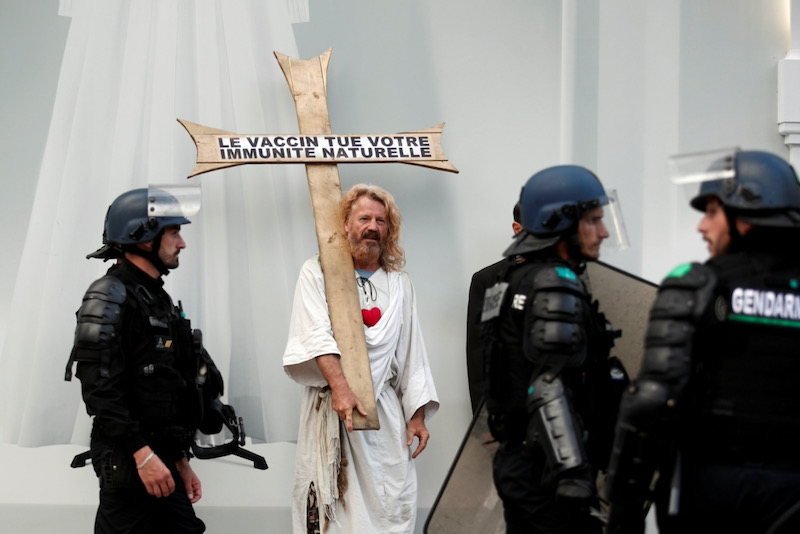[ad_1]
A man surrounded by police during a demonstration against the restrictions imposed by France on Covid-19. The cross says, “The vaccine kills your natural immunity.”
Photo CNS / Benoit Tessier, Reuters
Catholic clergy who question Covid-19 vaccination policies are berated by bishops across Europe.
In England, where bishops’ conference guidelines describe vaccines as “an important breakthrough in the protection of others and oneself,” some clergy in the Diocese of Portsmouth rebuked Franciscan Father George Roth for telling parishioners in an email that their lives could be endangered by the vaccinations.
The Austrian diocese of Gurk-Klagenfurt “resolutely†moved away from a priest in Preitenegg after writing to parishioners urging them to resist “the criminal gang mad about vaccines and their collaboratorsâ€.
In an appeal this month, Archbishop Stanislaw Gadecki, president of the Polish Bishops’ Conference, said vaccinations offered hope “for the normal functioning of societies” and reminded Poles of their duty to consider ” the requirements of the common good “.
Several diocesan bishops have since urged citizens to receive the vaccine, comparing it to massive tuberculosis vaccinations after World War II. Some encouraged parishes to donate their premises to vaccination teams.
Proof of vaccination or a negative test was required to attend the annual International Youth Festival in Medjugorje, Bosnia and Herzegovina, which began this week. Since mid-July, they have been a condition of entry into the Ecumenical Community of Taizé in France.
Proof of vaccination will also be required for all events of the Pope’s pilgrimage September 12-15 in Slovakia. Pope Francis will stop en route to Slovakia for the closing of the International Eucharistic Congress in Hungary, which requires proof of vaccine or a negative Covid-19 test.
While Covid-19 still wreaks havoc across Europe, Catholic bishops are supporting vaccination campaigns, while advising against coercion.
In Germany, where Chancellor Angela Merkel’s government has warned of tighter restrictions on those who refuse vaccines, the bishops’ conference president said in late July that vaccination should be a personal choice, but he said. urged Catholics to get vaccinated to ensure freedoms would not be taken away again if there was a new peak after the summer.
“I share the concerns of politicians – we will only defeat this virus if we all unite,” Bishop Georg Bätzing said in a statement.
“Being vaccinated means more protection and freedom not only for you, but for everyone in society. It therefore expresses solidarity and charity.
The German church’s internet portal, Katholisch.de, debated whether vaccinations should be mandatory to attend mass in order to make the church a ‘moral pioneer’, stating: ‘This would make it clear that the church supported science and advocated solidarity, as well as using its authority for something good and countering the many negative headlines and scandals. Even with growing infections, church services could remain lively, with singing choirs, peaceful handshakes, and a carefree reception of fellowship. “
However, another comment said excluding the unvaccinated would be “inconsistent with the Christian message.”
In neighboring France, people wishing to participate in leisure activities or use public transport will need proof of vaccination from Monday, a negative Covid-19 test or proof of recent recovery. Catholic bishops have supported compulsory vaccination for certain groups, despite numerous protests.
“Vaccination is a medical response to face an epidemic which risks further paralyzing economic and social life,” said the bishops’ conference.
“By making it compulsory for some and by imposing a health pass for certain activities, the government is fulfilling its legitimate responsibilities. It places restrictions on those who refuse the vaccine. “
However, Archbishop Pierre d’Ornellas, who heads the bioethics group of French bishops, said in a statement on his website that a “more tolerant approach” was needed for those with “legitimate hesitations and fears. “about civil liberties.
[ad_2]

